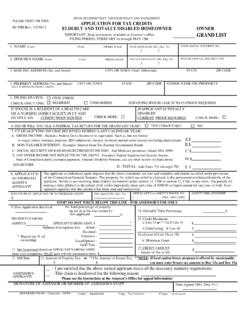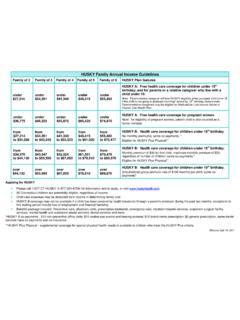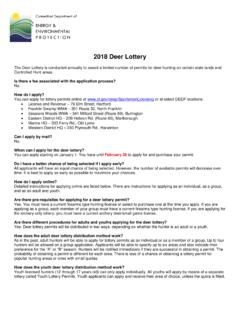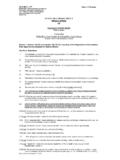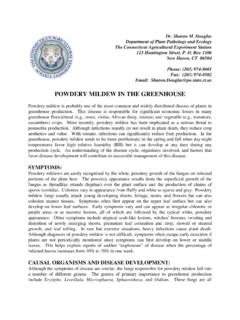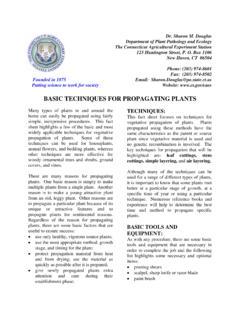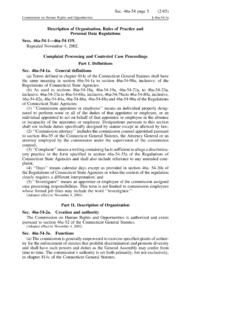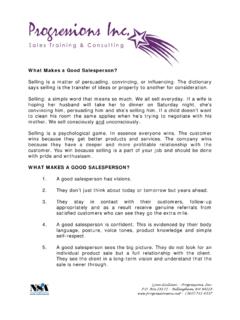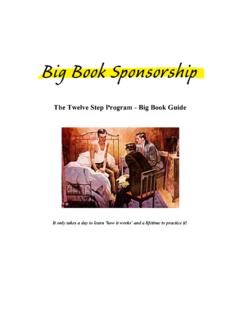Transcription of Spring 10 - Connecticut
1 S u p p o r t e d b y g e n e r o u s f u n d i n g f r o m C T s T r a n s f o r m a t i o n G r a n t Janis Tondora Rebecca Miller Kimberly Guy Stephanie Lanteri Yale Program for Recovery and Community Health 2009 Spring 10 Getting in the Driver s Seat of your Treatment: Preparing for your Plan 2 GETTING IN THE DRIVER S SEAT: PREPARING FOR your PLAN To me recovery means I try to stay in the driver s seat of my life. I don t let my illness run me. Over the years I have worked hard to become an expert in my own self-care. Being in recovery means I don t just take medications .. Rather I use medications as part of my recovery process .. Over the years I have learned different ways of helping myself.
2 Sometimes I use medications, therapy, self-help and mutual support groups, friends, my relationship with God, work, exercise, spending time in nature all these measures help me remain whole and healthy, even though I have a disability. (p. 10) Pat Deegan, 1993 Recovery is one word to use that describes the journey of living with a mental illness and/or an addiction. You might choose another word for yourself, but the main idea is finding out what works for you in getting what you want out of life. For many of us that have lived with a mental illness and/or an addiction, it has been a long journey and we may not have felt in the driver s seat much of the time. The tools here are designed to help you feel more in control and to help you discover what you want to work towards getting (or getting back) in your life.
3 This might include things like, getting a job, moving to your own apartment, making new friends, going back to church/mosque/synagogue, or whatever else you d like to do. For some of us, this may feel very different than how we ve ever been asked to do things many of us have not been asked questions by our providers like, What do you want to work on? or What s really important to you? . It may even feel overwhelming at first, and you might have a lot of feelings that come up for you. Take it at your own pace you can always save your work and come back to it at another time. Or, ask someone to help you work on it: a friend, a family member, your provider, whoever you feel most comfortable with. This toolkit can be useful for anyone regardless of whether they have a psychiatric disability or an addiction.
4 Everyone needs help at times setting goals, and figuring out what they want. This toolkit has some specific parts that are helpful to people with a mental illness or addiction, but could be really used by anyone. We hope you find this helpful remember, it s the journey, not the destination! For many people that we talked to in designing this booklet they talked about encouragement/support from others as being really important to their recovery and moving forward in their life. Is there someone you can think of right now who you would like to have involved while you complete this worksheet? Name_____ Contact Information:_____ A journey of a thousand miles begins with a single step. Lao-Tzu, Chinese Philosopher GETTING IN THE DRIVER S SEAT: PREPARING FOR your PLAN 3 Getting in the drivers seat of your treatment and recovery Within your mental health and/or addictions treatment, a recovery plan , sometimes called a treatment plan or service plan, is the document that you create with your team to help plan how you want to move forward towards your goals.
5 It is used: To help decide on goals that are important to you in your recovery and well-being. To help decide on the things that you personally need to do to make progress toward these goals. To help decide on the types of services and support your team can offer to help you achieve these goals. By your mental health team so they can document, and get payment for, the supports they provide to you. The following booklet tells you about your rights, and helps you to prepare for your recovery planning meeting so that you can get as much out of it as possible. It will help you to start identifying some of the areas of your life that you want to work on, and how to talk to your team about planning for next steps.
6 But first, a bit more explanation about a recovery planning meeting. What is a recovery planning meeting? It is a meeting: where you work in partnership with others to create your treatment plan. that happens on a regular basis usually every 6 months (although the plan can be updated as needed). where you have a right to invite anyone you would like to have involved. This can include professional staff ( , such as doctors or therapists) as well as friends or family members. What is your role in this meeting?: For this meeting, it is useful to: think about your priorities and goals ahead of time. ask for the types of support that would be most helpful to you. SPEAK UP and share your ideas and needs with your team!
7 Think about your own responsibilities in working towards your goals. 4 GETTING IN THE DRIVER S SEAT: PREPARING FOR your PLAN What kinds of things can I bring up at this meeting? This is your meeting. You can: Bring up anything you think is important to you and what you want out of your life. Discuss ways to pursue your goals, both clinical treatment goals and also your goals and dreams for employment, education, social activities, and your living space. What happens after this meeting? After this meeting: your clinician will work to include the things you talked about in a written document. This document is both a summary of the meeting and an outline of upcoming action steps for you and your team members (both professional supporters and friends/family who may be involved).
8 You should review the written plan with your clinician and make sure you understand it. Ask questions if you don t. You should sign the plan and ask for a copy for your records. Keep it in a safe place to protect your confidentiality. WORK your PLAN! Follow through on your personal action steps and take charge of your life! Next page: your Rights in the mental health system Nothing will work unless you do Maya Angelou African-American Poet GETTING IN THE DRIVER S SEAT: PREPARING FOR your PLAN 5 your Rights One of the important parts of being in the driver s seat of your treatment and your recovery is knowing your rights. It s sort of like knowing the rules of the road and can let you feel more confident in speaking up for yourself and advocating for yourself and asking for what you need.
9 It would be a good idea to familiarize yourself with the information provided by the State of Connecticut entitled your Rights as a Client or Patient (which can be found at the end of this booklet). As a person in the mental health system you are still afforded all of the rights that any other person living in the United States enjoys. Some of the rights you might want to be aware of and take interest in, in terms of your mental health care, might be: The right to be treated with dignity and respect. The right to privacy and confidentiality. The right to access your medical record. The right to a written treatment plan developed with you and your input, and tailored to your needs. The right to being fully informed about medications, treatments and medical procedures.
10 The right to refuse medications or treatments that you do not want. The right to file a grievance if you feel your rights have been violated by a provider of your treatment facility. Please remember that this is just a glimpse of the information you should be aware of concerning your rights. This information should in no way be a substitute for legal advice from an attorney or advocate. There are some situations where these rules may not apply or they may be applied differently. For example, rules in inpatient hospitals may be different from rules in an outpatient mental health center. The rules also change depending on whether or not you are in treatment voluntarily or if you have been mandated into treatment because of concerns that you might hurt yourself or someone else.
